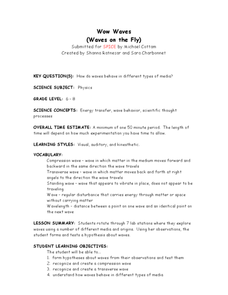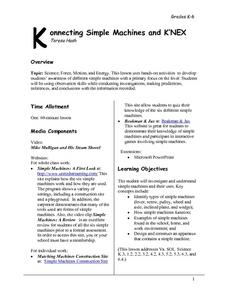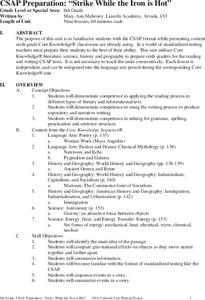Curated OER
Energy in the Form of Calories
Young scholars calculate the amount of food calories found in an individual peanut. In small groups, they set up the experiment so that a burning peanut will heat water above it. Using the temperature change and volume of the water they...
Curated OER
Minerals Prime
In this minerals worksheet, students answer fifteen multiple choice questions about mineral formation, volcano and mountain formation, mineral tests and properties of minerals.
Curated OER
Wow Waves (Waves on the Fly)
Students formulate hypotheses on wave behavior and test them. In this physics lesson, students compare and contrast transverse and compression waves. They determine the wavelength of transverse waves.
Curated OER
Rate of Photosynthesis
Young scholars investigate the rate of photosynthesis using elodea leaves. In this photosynthesis lesson plan, students place elodea in a test tube filled with water. They include baking soda and place the test tube under a lamp. Young...
Curated OER
Konnecting Simple Machines and K'Nex
Students study and identify different types of simple machines and how they work. They design a simple machine.
Curated OER
The Properties of Metals
In this properties of metals instructional activity, students read about the history of metal use and their properties. Students read about metallic bonding and answer three questions about bonding in metals.
Curated OER
What Information is on the Periodic Table?
In this elements instructional activity, students review the information that is found on a periodic table including atomic mass, chemical symbol, atomic, number, and electron configuration. This instructional activity has 7 fill in the...
Curated OER
Why are Electrons Important?
Students write electron configuration of elements using atomic numbers and they identify valence electrons. In this electrons lesson plan, students observe a demonstration showing the space-filling property of an electron. They also...
Curated OER
How Do Atoms Stick Together?
In this chemical bonding worksheet, students answer 10 questions about ionic bonding, covalent bonding, metallic bonding, Lewis structures, and intermolecular forces.
Curated OER
Light
Students explore light. In this light wave physics lesson, students construct periscopes, kaleidoscopes, color wheels, and pinhole cameras. Students observe and record characteristics of light demonstrated through the use of...
Curated OER
Fossil Fuels-Importance and Formation
Student is introduced to the concept of energy as a common factor among all things. They list three fossil fuels and describe how fossil fuels were formed. They then tell how much plant debris it took to form one foot of coal.
Curated OER
Effects of the Sun on Our Planet (Grades 2-4)
Students observe how the sun's rays can cause evaporation and discuss its role in the weather cycle. They discover what the sun's energy brings to plants. They examine how different types of technology can enhance the amount of solar...
Curated OER
CSAP Preparation: "Strike While the Iron is Hot"
Students survey several concepts in literature, science, history, and geography as a preparation for the CSAP standardized testing experience. This nine lesson unit provides exposure to the format and content of the test.
Curated OER
Melts in Your Bag, Not in Your Hands
Students study how the sun transfers heat to the earth through radiation. They examine how animals absorb energy from the sun to warm their bodies by experiment with chocolate melting. They examine sun safety.
Curated OER
States of Matter
Students explore the states of water. In this physical science instructional activity, students use ice and dry ice to observe the changes in the state of matter. Students record the results.
Curated OER
Light the Bulb
Students explore electricity. In this power experiment instructional activity, students determine what is required for lighting a bulb. Students develop an understanding of open and closed circuits, and how energy is formed
Curated OER
Tornadoes
Students use the Internet to research tornadoes. They consider tornado formation, energy forms and sources, ways to predict tornadoes, tornado safety and attempt to predict tornadoes in real time.
Curated OER
Methods of Heat Transfer
Eighth graders discuss the forms of heat transfer that relate to the human body. Discussion revolves around the ability of different designs of hats to change the rate of heat transfer to and from the body. Students then experiment...
Curated OER
Detecting Meteors by Radio in the Classroom
Twelfth graders describe and interpret the science of optical and radio telescopes, space probes and remote sensing technologies (Unit E) They explain the role of radio and optical telescopes in determining characteristics of stars and...
Curated OER
Geometry of Radio Meteor Reflections
Ninth graders investigate and describe ways that human understanding of Earth and space has depended on technological development. They describe and interpret the science of optical and radio telescopes, space probes and remote sensing...
Curated OER
Wheels, Gears, and Compound Machines
Fifth graders read selected pages from their science text and explain forces affected by wheels and axles. They read and discover that gears transfer forces and that gear combinations relate to compound machines.
Curated OER
The Web of Life
Learners explore the interconnectedness of living things in an ecosystem. They use pictures and arrows to develop a food web, and participate in constructing a class food web with students representing various parts of the web.
Curated OER
An Introduction to Thermal Spray Technology
Students discuss difference between kinetic and thermal energy, develop and demonstrate understanding of key concepts and characteristics underlying thermal spray techniques, list items used in their daily lives that are coated, examine...























